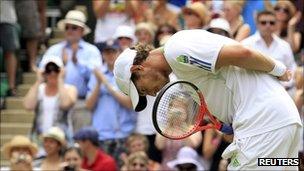Senior BBC pay 'to keep falling', says Lord Patten
- Published
The chairman of the BBC Trust, Chris Patten, on what he thinks the future holds for the BBC and executive pay.
Future leaders of the BBC will not be paid as much as current director general Mark Thompson, says the chairman of the BBC Trust, Lord Patten.
Thompson, who took up his post in 2004, earned £779,000 last year and £838,000 the year before.
"If there is another director general during my time as chairman of the trust, he or she won't be paid that," Lord Patten told BBC Hardtalk.
Lord Patten said he would "bear down" on other executive pay.
"The basic proposal is you cap the average of senior executive pay to the median pay in the organisation," he said.
Asked whether he thought BBC executives were paid too much, Lord Patten said: "I'm sure they're worth every penny of it but they're not going to be paid as much in the future."
In July the BBC's annual report said it was on target to reduce the senior manager pay bill by 25% before the end of 2011.
The paper stated wages had been reduced by 18.3% and on average, new senior managers were paid 8.7% less than the previous postholder.
'Painful choice'
During the interview, Hardtalk's Stephen Sackur asked Lord Patten whether BBC services would suffer once planned budget cuts were in place.
The BBC has said it needs to cut its spending by 20% - equivalent to 16% for the next five years in real terms - after last year's licence fee settlement.

Lord Patten said there were no plans to scale back the BBC's coverage of Wimbledon
"I hope it's not going to do serious damage," Lord Patten said.
He admitted the trust was in talks with senior executives about how they could "accommodate the BBC" to the new budget.
"But, for heaven's sake, we're talking about the BBC running for the next five years on £3.5bn a year. Plus the income it can raise from its commercial activities. Now we should be able to run a damn good public broadcaster on three and a half billion a year."
He said the BBC would focus on its "core and most valuable services" such as children, drama, news and factual programmes.
"Those are the things we'll have to spend more money on. We won't be able to spend as much money on sport. I suspect we won't be able to spend as much money on entertainment," he added.
The BBC has reduced its Formula 1 coverage, which Lord Patten said was a "painful choice".
"Everybody who loves motor racing is really cross with us because we did motor racing really well - and we will still be doing motor racing but not exclusively."
When asked whether the BBC's extensive coverage of the Six Nations rugby and Wimbledon were going to remain in place, he said: "Yes, I very much hope so."
- Published12 July 2011
- Published12 June 2011
- Published13 July 2011